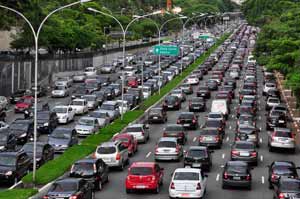Holiday Drivers

Remarkably, a new study by the RAC and vehicle insurer Ageas, shows that around 30% of UK motorists will avoid country lanes and smaller roads when travelling on holiday. Drivers would rather add considerable extra time or distance to their journey simply to stay away from narrow lanes or minor roads.
Three quarters of urban-dwelling drivers responded to the survey to indicate that they found driving on such roads to be stressful, a figure which remains high at 58% for motorists across the UK.
Drivers cited a considerable number of factors as the reason for their reluctance to using these roads; among them was a fear of accidental collisions, which would not only be a severe problem but could also cause private or motor trade insurance policy premiums to rise if they were at fault.
Motorists cited problems when encountering vehicles coming in the opposite direction – more than half suggested that road etiquette would be an issue, while almost two thirds were worried about being able to pass other cars in tight spots.
Many drivers were also concerned about having to reverse down these roads to get out of a jam and were unnerved at the thought of encountering wider commercial vehicles such as tractors and coaches. Almost 10% said they had argued with other drivers in such situations.
With these narrow roads accounting for hundreds of thousands of miles of Britain’s highways, it’s remarkable how few drivers feel confident in navigating them.
The RAC has suggested that drivers should plan out their routes in advance and even disable satellite navigation systems which will generally attempt to take drivers by the shortest route, regardless of road type or condition.
Many motorists said they were prepared to accept detours extending to 20 miles or over half an hour in order to avoid especially difficult routes; again, city drivers were prepared to accept the biggest increase to their journey time or length.

Given the expensive nature of motoring, from the rising price of soaring fuel and cost of insurance, the reluctance of many drivers to minimise time and mileage is quite surprising.
Another concern is the high speed limit on many of these narrow roads, with 60 mph seen as far too high given the limited visibility and lack of suitable passing places, you won’t find too many out test driving new vehicles using trade plates on these roads!
It’s a sensible idea to practice driving on such routes in advance of a holiday, especially if you’re not used to these road conditions. Having to negotiate tight routes with limited visibility can be stressful at any time, and especially at holiday time when roads may be busier, and your car will likely be full of family members or luggage adding to the worry.
Given the increasing number of British citizens taking staycations and heading for the nation’s beaches all year round, it does seem eminently sensible to get out and practice driving on these roads, or more carefully plan journeys to avoid any likely issues.
With up to 16 million such journeys expected through the summer months, anything you can do to mitigate the risk of accident or delay is wise.







